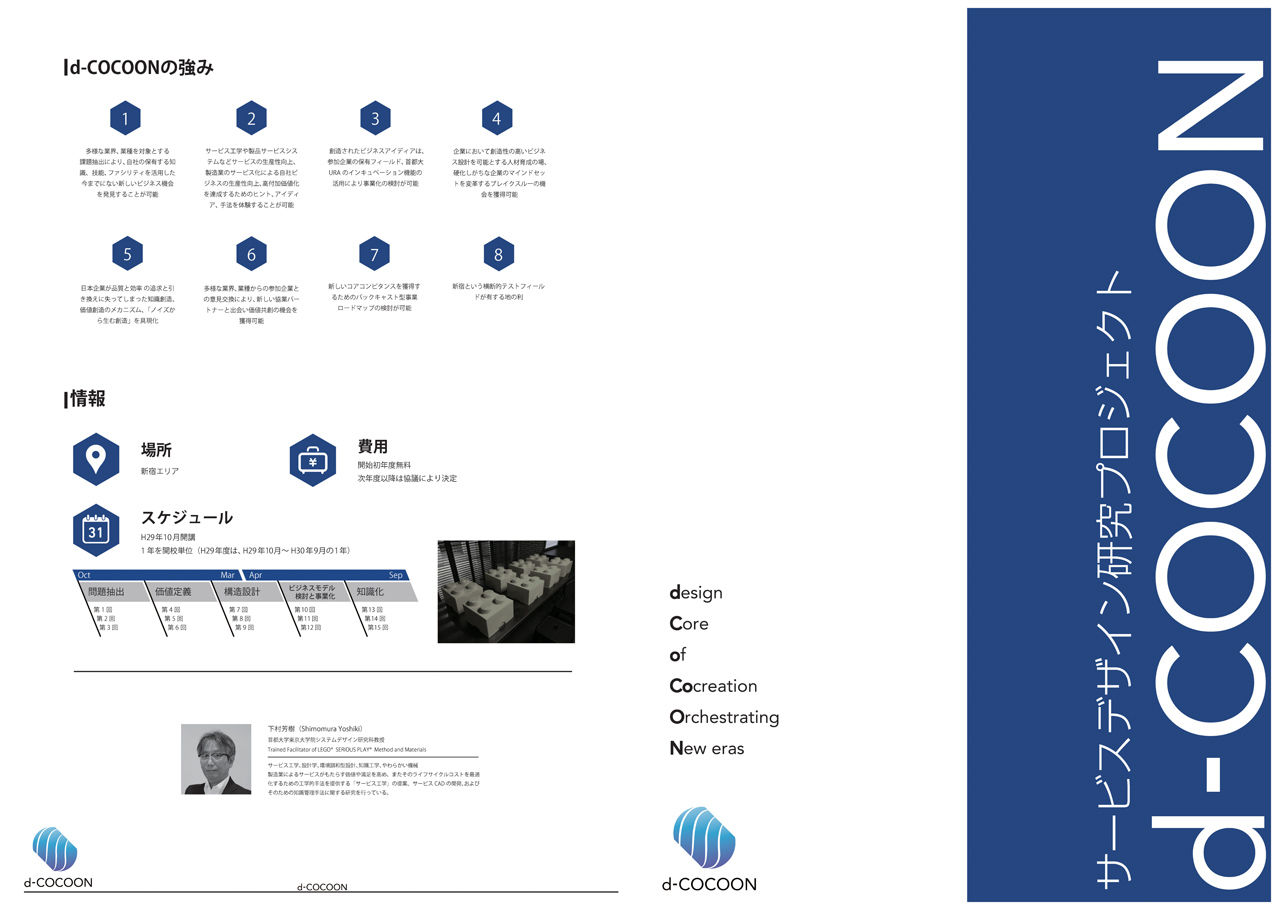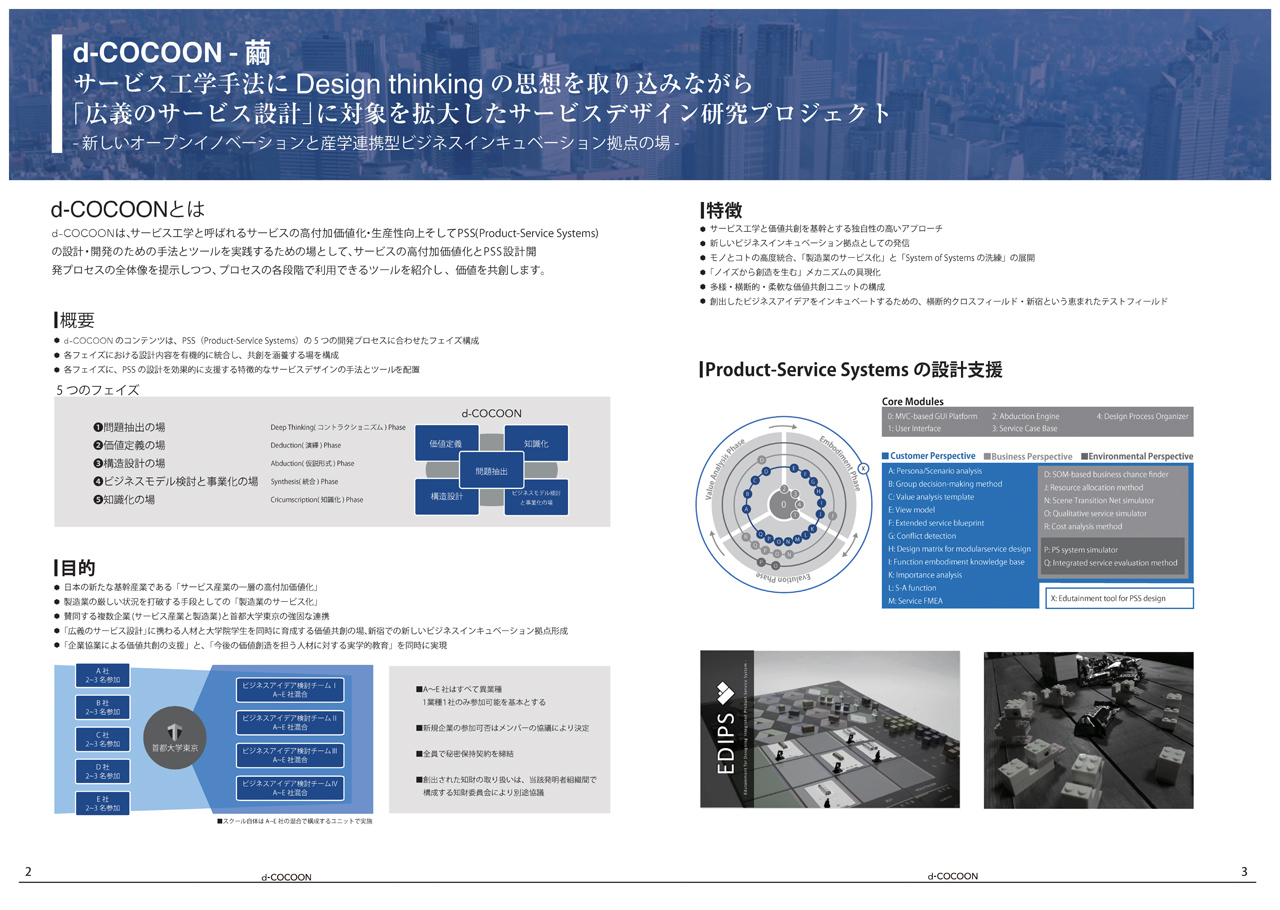|
|
d-COCOON (design core of cocreation orchestrating new-eras)
Background
In recent years, problems such as sluggish response and capability to the international demand, saturation of artifacts, rapid growth and commoditization of emerging countries, and serious environmental problems are occurring internationally. Moreover, shrinking domestic market, lack of successor, declining birthrate and aging population, reduction and weakening of unprofitable business, frequent occurrence of large-scale natural disasters, old aged infrastructure of high growth period are happening in Japan. Therefore, the business situation is expected to survive for the immediate tough situation. Even though, the Japanese manufacturing industry has gained the ability to realize outstanding quality and advanced productivity through high economic growth, it has lost the mechanisms of knowledge creation and the "noise" necessary for creation.
Tokyo is the center of industry where many companies are located and is responsible for about 20% of Japan's GDP. In the "implementation plan for 2020", The Tokyo Metropolitan Government is aiming to achieve 120 trillion yen of GDP in Tokyo, hence it is essential to realize the revitalization of local companies, productivity improvement, and high added value to realize it. Among them, the tertiary industry including the information and communications industry have grown rapidly, and there is a drastic change in the industrial structure. For example, the information and telecommunications industry already accounts for about 10% of GDP in Japan as a whole, and industrial service center is progressing rapidly, and Tokyo companies occupy for more than 50% of Japan's information and communication industryfs GDP. In response to the above changes in the social and industrial structure, Tokyo Metropolitan University Tokyo insists on the importance of the two aspects of improving productivity of services and servitization of the manufacturing industry as a means to respond to the increasing social demands.
Overview of the d-COCOON
Comparing with d - school advocated by IDEO (Stanford University cross - disciplinary program which constitutes the procedure and method for realizing 'creative design' based on design thought ideas and toolset), d-COCOON is a new d-school that expands its scope to service design in a broad sense by introducing service engineering methods. As a new "business incubation base", we are strongly aware of the design as a base for business-academia collaborative business incubation, not as a cross-graduate program.
Under the cooperation of multiple companies (service industry and manufacturing industry) and Tokyo Metropolitan University, we are acting as a place of value creation; as a new business incubation base for personnel engaged in "broad service design". It also simultaneously realizes "support for value creation through corporate collaboration" an "practical education for human resources who will contribute to future value creation"
Context-centered design
In service design at d-COCOON, we focus on "context-centered design". Context-centered design is a design that puts emphasis on increasing context value. Contextual value is co-created by providers and recipients by interacting and collaborating in the process that product services are used and consumed. In order to raise this context value, it is necessary for PSS providers and recipients to share, understand and use their contexts and necessary knowledge. The reason why "context-centered design" is important is the idea of knowledge management represented by SECI model.
Knowledge management philosophy represents the basic mechanism for knowledge creation to create organizational knowledge, which is the company's internal strategy. Due to the deployment and dissemination of Service Dominant Logic (SDL) the situation is changing, the need for organizational knowledge and context sharing surrounds business is no longer only required by internal organization of the provider, but also between the provider and the recipient and other stakeholders. Therefore, the context is the result shared by stakeholders, and it becomes necessary to consider Ba which is the concept of placeability including space and time span which is the basis of the existence of human and society. What should be realized by the manufacturing industry is to effectively share the context and necessary knowledge between providers and recipients, builders and users to form good quality of Ba. We will determine the demands made by customers and how to satisfy them, and the quality of value co-created will be gained. Therefore, it is necessary to place emphasis on "context-centered design".
Design phases
The service design of d-COCOON consists of the following five design stages of PSS.
1. Problem Extraction
2. Value Definition
3. Structural Design
4. Business Model Review and Commercialization
5. Knowledge Creation
By arranging service design methods and tools that characterize the logic
of design at each design stage in each area and learning them, we support
co-creation of value through corporate collaboration which is the purpose
of d-COCOON and realistic education for human resources who are responsible
for value creation.
 |
| Nonaka's SEKI model |
 |
| Design Phases |

 |
| d-COCOON |
| |
|

